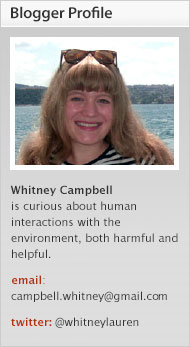« Prev Next »
Welcome to Green Screen, a blog that brings you t

As a blogger for Student Voices, I've had the opportunity to explore many environmental topics, ranging from snowflake photography to contaminated tap water to time-lapse recordings of growing plants. Though I learned lots while writing these posts, about technology, innovation, and the goals they strive to meet, I think the one post that most shaped my attitude toward green writing was "Oil and Water" about the BP oil spill. After I learned about the situation, I was preoccupied by the fiasco, as I'm sure many in the world were. Flooded by media commenting on the recovery and capping efforts, I was gripped by the disaster's urgency and the apparent failure to address it. I remember watching little boats try to skim blankets of crude from the ocean's surface and feeling as overwhelmed as the nylon boom. Getting to write the post let me feel more involved, but when the wellhead was finally capped 86 days after the rupture, I was left with a sense of frustration that I couldn't quite place.
Months later, I found my uneasy hunch articulated in a post by the Guardian's Mark Coeckelbergh. Coeckelbergh writes, "As consumers, we continue to depend on oil in various ways and therefore maintain the oil-hungry system that makes oil companies drill in deep water and undertake other risky activities . . . If we discuss oil production disasters, therefore, we should also discuss how we live." BP must be held accountable for its decisions; an incredible interview with Deepwater Horizon explosion survivor Mike Williams can be seen here, in which serious allegations of negligence and poor judgment are detailed. But I think we should also consider our own responsibility — that the rig wouldn't have been drilling in offshore waters if people's lifestyles in different degrees hadn't demanded it.
Every day, people make choices that affect the planet, whether it's in a lab, an office, a courtroom, or a grocery store, and I agree with Coeckelbergh that we would benefit from an informed discussion about how these judgments shape the world. Although this may make me sound like a tree-hugging hippie, I really do think that successfully implemented sustainability programs result from the respectful communication of opinions. I hope Green Screen can contribute to this discussion and I'd like to encourage you and our fellow neighbors to join in it. Think of this blog as a global environmental bulletin board!
The reason why I'm calling us neighbors is because I think it's an effective metaphor for green awareness, on all levels from the local to the global. Neighbors tend to think of themselves as community members that look out for residents and their common interests. They gossip about changes to their co-inhabited spaces. They feel responsible for the upkeep of the neighborhood and making it a safe, enjoyable, and productive area. When I use the word "neighbor," it's because I think the status of our globe deserves attention not only because it's breathtakingly beautiful, abundant, and humbling in its capacity, but also because it's where we live.
This 1990 image from the Voyager spacecraft depicts Earth from a distance of more than four billion miles. In his book Pale Blue Dot (1994), the astronomer Carl Sagan offered his view of its significance:
Look again at that dot. That's here. That's home. That's us. On it everyone you love, everyone you know, everyone you ever heard of, every human being who ever was, lived out their lives. The aggregate of our joy and suffering, thousands of confident religions, ideologies, and economic doctrines, every hunter and forager, every hero and coward, every creator and destroyer of civilization, every king and peasant, every young couple in love, every mother and father, hopeful child, inventor and explorer, every teacher of morals, every corrupt politician, every "superstar," every "supreme leader," every saint and sinner in the history of our species lived there — on a mote of dust suspended in a sunbeam.
Thanks for reading. Looking forward to the conversation about our Pale Blue Dot!
Image Credit: NASA/JPL






















Ilona - Can't wait to post more on GS! Thanks for your support. About Obama's SOTU energy comments, I thought he set several ambitious goals, but with some big qualifications. eg. He pledged that by 2035, 80% of US electricity will come from clean energy, but he included nuclear, clean coal, and natural gas in that category. How clean could coal be? http://www.huffingtonpost.com/josh-dorner/brian-williams-clean-coal_b_144764.html